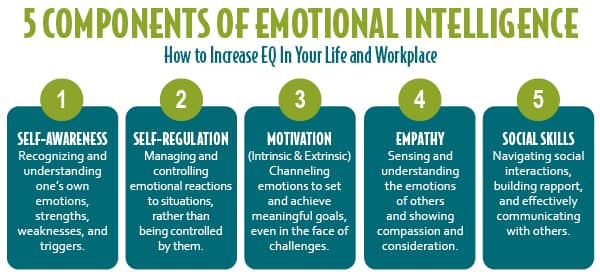In today's interconnected world, the need for emotional intelligence in the workplace is undeniable. Burnout, blow-ups, interpersonal conflicts, annoying employee habits, and micromanaging bosses... sound familiar?
It's clear that being emotionally intelligent IS critical in the workplace to navigate these challenges. And since we spend one-third of our time at work, don't you think it's time to make it enjoyable, not just tolerable?
Estimated reading: a long read but totally worth it! Learn to 🏄 your emotions! 😆
 Heartmanity is proud to partner with outstanding companies that we wholeheartedly recommend so this post may contain affiliate links. You can read our full disclosure here.
Heartmanity is proud to partner with outstanding companies that we wholeheartedly recommend so this post may contain affiliate links. You can read our full disclosure here.
Table of Contents - jump to what piques your interest!
What Is Emotional Intelligence?
Emotional Intelligence Brings Out the Best of Our Humanity
Primary Components of Emotional Intelligence
Why Is Emotional Intelligence Important in the Workplace?
Benefits of Emotional Intelligence in the Workplace
27 Strategies to Raise Emotional Intelligence in the Workplace
Examples of Emotional Intelligence in the Workplace
Conclusion
Frequently Asked Questions
What Is Emotional Intelligence?
Let's define emotional intelligence so we have a foundation.
Emotional intelligence is the ability to understand, manage, and effectively use one's own emotions, and to navigate and build relationships with others. It is also referred to as an emotional quotient or EQ.
First made popular by Daniel Goleman, ample research shows that individuals with high emotional intelligence tend to be more successful in their careers, exhibit stronger leadership skills, and contribute positively to a healthy work environment. Hands down, it is the most essential skill set to develop personally and professionally. And after this article, you'll be excited to dig in—yes, you can increase your EQ, unlike IQ, which is a set amount.
If you're interested in history, read our article: "The History of Emotional Intelligence in the Workplace."
Emotional Intelligence Brings Out the Best of Our Humanity
At the very core of being human is emotional intelligence.
We all feel.
We all need to make sense of our experiences. And emotions are the compass to do just that!
Whether or not you have a healthy relationship with your emotions determines the quality of your life and how quickly you succeed in your work life.
People with low emotional intelligence often have difficulty grabbling with stress. High emotionally intelligent people have resiliency and the ability to bounce back quickly. By improving your emotional intelligence, the ups and downs of life become easier, and your confidence shoots up. People with high emotional intelligence can waltz through challenges with finesse and recover from disappointment with a positive attitude capturing the lessons from setbacks. Doesn't that sound valuable!?
Trust me, the best of our humanity comes out when we are emotionally intelligent! And it's no longer a "you either got it or you don't" proposition. YOU can develop a high EQ and transform your life and work.
Check out these emotional intelligence courses to enhance your EQ skills!
Primary Components of Emotional Intelligence
Whenever I coach executives of large companies, work with entrepreneurs of startups, or train teams, several key skill sets are frequently missing—the result:
- workplace stress is out of control
- communication breakdowns are common
- conflict between team members is prevalent.
- leaders' actions don't match company values or mission
- employees don't feel heard or valued
Emotional intelligence can help.
Emotional intelligence encompasses a wide range of skills and abilities that enable individuals to recognize and manage their emotions, understand the emotions of others, and use this dynamic information to guide their thinking and behavior. However, EQ is broken into five key components: self-awareness, self-regulation, motivation, empathy, and social skills. See the EQ chart below to discover what each one covers.

Why Is Emotional Intelligence Important in the Workplace?
With burnout at an all-time high and company turnover commonplace, EQ is no longer negotiable—it's a necessity!
Why? Because our very well-being depends on it!
For instance, if you don't know how to set internal or external boundaries, you will overwork and be unable to say no. RECIPE FOR BURNOUT!
Or, if you cannot manage your emotions, you might snap at a valued customer, or blow up at your manager, or miss work due to a hangover. None of these examples translate to job security or a promotion! WHO wants an employee who cost the company money?
And what about empathy!? If you are unable to sense your colleagues' emotions and have compassion for them, truly connect in an authentic way, the workplace can be lonely and even brutal.
Now that we've reviewed a few disadvantages of low EQ, let's look at the benefits to a company with level-headed, emotionally sound employees and leaders.

Benefits of Emotional Intelligence (EQ) in the Workplace
There are as many benefits for a company having an emotionally intelligent culture as stars in the night sky of Montana—the Big Sky Country—but here are a few of the most outstanding!
- Job satisfaction skyrockets
- Miscommunication drops
- Collaboration becomes lively and supportive
- Increased productivity and efficiency
- Effective conflict resolution
- Enhanced positive relationships
- More fun and light-hearted interactions
- Heightened can-do spirit on teams
- Workplace drama declines
- Greater awareness of impact
- Raised tolerance for differences
- Retention increases; sick days plummet
- A supportive and positive work environment is fostered
So, if improved emotional intelligence is critical, how do we start implementing it in real life, every day?
One of the tricks I've learned in nearly two decades of executive coaching is how success is driven by focusing on small, sustainable changes. The brain values what we put our attention on, but it also requires consistency and intensity to change neural circuitry and automate a behavior.
This is why I came up with twenty-seven doable actions for everyday life. Small is BIG!
Let's look at some simple yet powerful ways to increase emotional intelligence in the workplace. Pick your favorite! (My all-time party favor is #17 and I'm still trying to master #8.)
27 Strategies to Raise Emotional Intelligence in the Workplace
Implementing emotional intelligence at work isn't as difficult as most people think. It boils down to a lot of micro-habits, and an earnest commitment to create a thriving culture.
Below are vital emotional skills, ways to promote higher emotional intelligence, and strategies for using emotional intelligence practically in everyday life.
1. Observe your thoughts, feelings, and behaviors to raise self-awareness.
Whether you're an employee or a CEO, the helpful practice for greater emotional intelligence is to reflect on your emotions, observe any triggers you might have, and pay close attention to your reactions to various situations. By raising your observation, you will get key insights that help. As soon as we consciously observe ourselves, automated behavior comes to the daylight for change. Now, you have the power to choose what you'd like to upgrade. Unconscious behavior = little to no opportunity for change.
2. Enhance your emotional vocabulary.
It's so easy to go through our day without even thinking about our emotions. However, research has shown that when we can identify emotions, knowledge helps us to be more self-aware. Identifying a feeling and thinking of synonyms can increase emotional understanding while also making your conversations more engaging and interesting. Accurately describing your feelings is foundational to emotional awareness and stress management.
3. Find your True North and use it as a compass.
Finding your "true north" amidst a sea of demands and responsibilities at work requires a deliberate and thoughtful approach. The easiest and quickest strategy to navigate through chaos and overwhelming feelings is to use your values as a rudder.
Take time to clarify your core values and what truly matters to you. What are the principles that guide your decisions and actions? Having a clear understanding of your values can serve as your compass, helping you make choices that align with what's most important. And emotionally intelligent people are rooted in what is most important to them; they don't get distracted by shiny objects that don't lead to fulfillment of their goals.
4. Take time for introspection and analyze interactions.
A fantastic way to get more acquainted with your emotions and motivations is to spend time in introspection.
Introspection and analysis are powerful tools for developing emotional intelligence. They both involve self-awareness and a willingness to learn and grow from our experiences.
Examining and getting curious about your thoughts, feelings, and reactions, helps you be cognizant of your inner workings. These musings will uncover why you think and feel the way you do in certain situations. Self-examination will also support a greater understanding of your emotional triggers, biases, and patterns of behavior.
By reflecting, you can uncover underlying beliefs and insecurities that might influence how you interact with others or be limiting you. This self-awareness allows you to make conscious choices about how you respond to situations rather than reacting based on automatic impulses.
Learning from introspection enables you to make intentional changes, enhancing your emotional intelligence and improving your relationships, communication, and decision-making skills.
5. Ask for constructive feedback.
A valuable way to accelerate growth is to ask for feedback from trusted people in your life and at work. However, when I suggest this action, most people take five steps back from me! They are afraid of what their peers will say. However, an accurate mirror of how we impact others is crucial for development.
Here are some questions to ask that will give you insights.
COURAGE TIP: Be sure and remain open to their feedback and if you don't agree and feel like what they're saying is inaccurate, just respond with "That doesn't feel true to me but I'll consider it further." Then thank them! It takes courage to receive feedback but also to give it.
Questions for Gathering Feedback:
- What do you think are my strengths that contribute to the team's success?
- Are there any specific areas where I could improve my performance?
- Can you provide examples of recent situations where my contributions made a positive impact?
- Is there any skill or knowledge gap you believe I should focus on to excel in my role?
- Do you have any suggestions on how I could enhance my communication and collaboration with colleagues?
- How do you perceive my adaptability to change and willingness to learn new things?
- Is there any behavior that I consistently do to repel or offend others?
When we're ready to improve our emotional intelligence, it's imperative to know our strengths and weaknesses from others' perspectives. Those you work with may identify blind spots that will greatly assist you.
6. Promote emotional well-being.
Promoting emotional well-being in the workplace is essential for creating a positive and productive environment. Your environment begins with YOU and your internal landscape. Here are a few ways that will help maintain calmness even when stressed:
Gratitude Journaling: Keep a journal where you write down things you're grateful for each day. This practice can shift your focus toward positivity, reduce stress, improve focus, and improve your overall mood.
Mindful Eating: The only break you might get is a lunch break, if so, this suggestion is perfect! Instead of rushing through lunch, gulping down your food, do this instead. Pay attention to your meals without distraction: savor every bite, chew thoroughly, and fully appreciate the flavors and textures—ha! ... even that McDonald's Big Mac is worth savoring. Be present to the experience without conversation and no thoughts of what you need to get done!
Doodle Breaks: Love this one! Take short breaks to doodle, draw, or sketch. This creative outlet can help you process emotions and improve your overall well-being. One client I recommended this activity to started sketching as a serious hobby and ended up selling her art! Sometimes healthy habits can excavate unknown talent.
Remember, these activities can enhance your emotional well-being and create a more positive and fulfilling work experience for yourself.
7. Acknowledge your emotional triggers.
Identify situations and co-workers that evoke strong emotional responses. Paying closer attention to your emotional terrain will begin to quell emotional outbursts, and you will learn to understand yourself better. Once we identify raw areas, we can strategize to prevent emotional outbursts. Journaling about them can also help.
Just like a soldier walking a minefield, we need to know where not to step and where to cautiously move in our emotional terrain. Knowing your hot spots will assist you in self-mastery.
Learn how to modulate emotions and map your triggers with these emotional intelligence courses. Stand out at work and enhance the quality of your relationships!
8. Practice extreme self-care.
Frequently, when our schedules are full, or there's a rush project, self-care is the first thing to go! (I'm raising my hand... guilty verdict.)
Yet, taking care of ourselves on the job is imperative to counter stress and prevent burnout.
Gallop reports that missed work is estimated to cost the economy $47.6 billion annually in lost productivity. Research consistently underscores the critical importance of self-care for overall physical and mental well-being. Many companies now provide health benefits such as gym memberships and unlimited PT.
However, even if your company doesn't make employee self-care a priority, YOU can prioritize self-care within the workplace—it's not just a luxury, it's a mindset!
Self-care is a necessity that profoundly impacts our overall well-being, emotional balance, and effectiveness. This practice directly influences our mental and emotional health and overall performance.
By caring for yourself, you're equipped with the needed vigor for sustainable productivity. Take regular breaks: a brief walk, deep breathing, or a moment of mindfulness contribute significantly to your ability to recharge and stay centered amidst work demands.
Open communication with colleagues also creates a supportive environment that fosters personal well-being and professional growth. And while being proactive is essential, recognizing when to delegate tasks is also an integral part of caring for yourself.
Delegation is a skill that acknowledges the value of teamwork and is often overlooked in the self-care column. For example, I worked with a dedicated leader of a large company who thought he had to do everything himself and had hundreds of unused PT days!
Yes, he was on the hamster wheel of chronic stress until I required him to step off and start building a team he trusted to delegate.
Habits can work for us or against us!
Make self-care a habit!
9. Discipline yourself by controlling impulses.
Have you ever said or done something impulsively and then regretted it? Yup, not usually a great result, right?
Impulse control refers to the ability to manage and regulate one's immediate urges, reactions, or desires in favor of making thoughtful and considered decisions.
It involves P A U S I N G before acting on an impulse, especially when intense emotions are sparked, then choosing a response that aligns with long-term goals, values and the best outcomes for the situation.
Exercising impulse control contributes to maintaining a professional demeanor, even in stressful situations. This restraint is vital for building credibility and trust with colleagues, clients, and superiors.
When you learn self-control, you will avoid making hasty decisions that may have negative consequences. Once you calm yourself, you can give more careful consideration of options and potential outcomes before taking action. Restraining your knee-jerk reactions will prevent behaviors that could damage trust or lead to misunderstandings.
Practice delaying immediate gratification by consciously choosing to wait before acting impulsively. According to the Mental Health Coalition, the emotional pathway for self-control is:
- FEEL - name your emotion before it rushes away.
- ACCEPT - know that it's okay to feel that way.
- MANAGE - try a coping skill to embrace or diffuse
- SHARE - talk to your loved ones and tell them how you're doing
Over time, this practice strengthens your ability to resist impulsive urges, self-modulate, and get better results. And if you master self-care, you'll be far more likely to control impulses, too!
10. Cultivate self-regulation.
Sometimes it can be challenging to pause before reacting emotionally. However, it's crucial to be able to self-calm so we can respond thoughtfully in our interactions at work. Perhaps, a co-worker slacked on a vital project, and you lashed out. You have every right to be upset, yet, how you respond will determine the outcome and either nurture or damage the relationship.
Our first responsibility is modulating our emotions so that our impact is positive. And when you get curious, often, you discover the other person had a legitimate reason. Honest conversations with co-workers can go a long way to a more successful project next time.
11. Strengthen your resilience.
Developing the ability to bounce back from setbacks and challenges is imperative with the unpredictability of our lives. Perhaps, you didn't get that promotion and raise you hoped for. Disappointment and loss can be challenging to accept and process. Resiliency is elicited by first feeling our emotions, then having the ability to recognize the facts surrounding a situation. Perhaps, when you reflect, you may discover needed skills in the workplace to nail that promotion next time.
12. Learn about what motivates you.
Motivation in the workplace is the driving force that propels individuals to take initiative, invest their energy, and strive for excellence in their tasks and responsibilities. It's the spark that ignites productivity and fosters a positive work environment.
When motivated, employees exhibit higher engagement, creativity, and commitment to achieving personal and organizational goals. However, effective workplace motivation is more than just a one-size-fits-all concept. There are two primary forms of motivation: intrinsic motivation and extrinsic motivation.
Being internally motivated emerges from a combination of intrinsic factors, such as personal fulfillment, what a person is passionate about, and a sense of accomplishment. Find out what intrinsically motivates you and do more of it! It's like replacing your small Datsun pickup with a Dodge RAM!
Extrinsic motivational factors are common in businesses. They include recognition, pay increases, rewards or bonuses, and opportunities for advancement. External motivators are outside of us, and can also be negative motivators, such as an upset boss we avoid or a big project that intimidates us.
The key is knowing what motivates us and then utilizing that knowledge to succeed.

13. Develop problem-solving skills.
Approach challenges, conflicts, or disagreements with a solution-oriented approach. Leaning into conflicts will enhance emotional intelligence.
When employees on a team are good at solving problems, they navigate challenges, make informed decisions, and adapt to changing circumstances. Problem-solving encourages critical thinking, creativity, and resilience, allowing employees to approach complex issues confidently.
Learning to approach challenges cognitively involves cultivating a structured approach:
- identifying the problem
- gathering relevant information
- brainstorming potential solutions
- evaluating their feasibility
- implementing the best course of action
It also entails seeking feedback, reflecting on outcomes, and refining strategies for continuous improvement. The better you are at solving problems, the more agile and armed with resiliency you will be! And you'll have to quell your emotions to think from your logical brain, an added bonus.
14. Practice active listening.
Often listening is undervalued and is a foundational EQ skill. But let's face it; we tend to think of what we want to say rather than being fully present to the person talking. Active and attentive listening is a quick way to raise your overall understanding of the people around you.
Pay attention to other people's expressions, body cues, emotions, what words they choose, and their unique perspectives during conversations. This practice helps to tremendously increase understanding and discover common ground between you and the other person. When we're too full of ourselves, there's no room to really understand another person.
15. Encourage open and honest communication.
Creating an environment where employees feel comfortable sharing their thoughts and emotions is critical for any business or industry. Talent can only be fully appreciated or utilized with this aspect within a company.
When our goal is to create a work culture where people's opinions are heard, and great ideas are acknowledged and acted upon, the number one priority is safety. Employees need to be able to get vulnerable without creating workplace drama, and when there is emotional safety, people in the workplace tend to open up and engage more fully. So if you are struggling with employee engagement, consider focusing on this action.
16. Focus on improving communication.
Communication is a vital social skill! Many people think they communicate clearly; most don't! If you don't believe me, try observing how many miscommunications, missing information, or conversations with misunderstandings there are in one work day. Or check out these stats. You'll be a believer!
What is needed to ensure that you are communicating effectively?
Here are some key actions to put your attention on:
- Clearly express your thoughts and feelings while also being receptive to others.
- Fine-tune conversations to appeal to the listener.
- Seek mutual understanding.
- Listen attentively to the speaker showing interest through nods, responses, and eye contact.
- Provide give-and-take in conversations: avoid dominating or only silently listening.
- Create a win-win when there are conflicts.
17. Cultivate mindful optimism.
Cultivating mindful optimism is striking a balance between positivity and realism without falling into the trap of Pollyannism. It goes beyond superficial positivity and acknowledges difficulties as they arise while maintaining a proactive and positive frame for moving forward.
Mindful optimism involves being aware of the challenges and opportunities while maintaining a favorable outlook.
Fostering mindful optimism means nurturing a growth mindset. Rather than focusing on immediate success, individuals can set meaningful goals and appreciate progress. By adopting a growth-oriented attitude, individuals and teams are encouraged by an understanding that setbacks are not indicative of one's overall potential. Therefore, a sense of perseverance is amplified. It's about finding the silver lining within our challenges and maintaining a realistic understanding of the situation.
18. Intentionally foster positive relationships.
Do you have rapport and trust with your colleagues? Does your manager, direct report, or team leader trust you?
A part of social awareness on the job is the desire to understand and manage our relationships so we can enhance them. When we deliberately promote respectful, collaborative, and supportive relationships, we stand out, improve relationships, and have better success in the workplace.
Relationships are our greatest resource and a critical part of every aspect of our lives. They're a great place to start to build an emotionally intelligence workplace. Investing in work relationships leads to unexpected opportunities and long-lasting friendships.
19. Practice mirroring your colleague's emotions.
A mirror is a neutral reflection of what it is seeing—no opinions, no judgments, no advice.
To mirror a person during conversations, consciously match your response to the speaker's tone and expressions. If they talk slow, don't be talking rapidly. Slow down. If they are expressive, be a little more dramatic.
Mirroring for others helps them feel heard and seen while enabling us to match people better and nurture our ability to empathize. The ability to mirror also helps you to pay closer attention and experience emotions from their perspective, which fosters a deeper understanding of their feelings and a better connection.
20. Develop empathy.
One of the most significant skills for interpersonal relationships is empathy—the ability to put yourself in others' shoes.
Learning to empathize and understand others' feelings and viewpoints can bring more ease and connection into work relationships and is an anchor for calm interactions that melt differences into understanding. As a practice, try looking underneath what the person is saying and pay attention to their feelings. These discoveries will reveal far more than words.
For an in-depth look at empathy, read: "What Is Empathy and Why Is It Important?"
21. Develop and practice conflict resolution skills.
Conflict resolution has tremendous importance in the workplace. However, very few people relish conflict, and many avoid it at a considerable cost to themselves and the company. Being a people pleaser may feel like a viable solution, but it is exhausting and you pay a very dear price.
Learn how to improve your ability to handle conflict effectively:
- your emotional stress will go down
- you will gain the respect of colleagues
- interactions will be smoother
- there will be far more understanding
- it will build a foundation of trust
- leads to masterful leadership and management.
Steps to improve and develop the emotional intelligence competency of conflict resolution involve combining self-awareness, empathy, and effective communication.
First, it's essential to understand your own emotions and triggers in conflict because this self-knowledge forms a groundwork for resolving differences. Additionally, practicing empathy enables you to truly understand the perspectives of others. It also helps improve the ability to identify core problems instead of provoking unproductive power struggles.
Actively listening and putting yourself in their shoes helps you grasp the other person's emotions and concerns, creating a more conducive atmosphere for resolution. Maintaining composure and managing your emotions are crucial during strife.
And lastly, timing plays a pivotal role in conflict resolution; choosing a neutral, private environment and the right moment ensures that both parties are ready for an open and honest conversation.
Master this one EQ competency and you have a goldmine!
22. Promote teamwork: collaborate effectively by valuing diverse perspectives and contributions
Create an atmosphere where everyone's backgrounds are acknowledged and respected, promoting psychological safety. Emphasize the importance of managing emotions during conflicts and staying composed during disagreements.
Conduct regular team check-ins or huddles to discuss work-related matters and personal well-being. This conscious attention to well-being enables people to connect on a deeper level, understanding each other's experiences and challenges, which nurtures a sense of camaraderie.
Provide opportunities for teams to build camaraderie by sharing experiences and challenges, helping them better understand each other's motivations and concerns. And encourage using "I" statements during discussions to express feelings and viewpoints respectfully.
Focus on collaborative problem-solving rather than assigning blame. Mutually beneficial solutions are revealed when we encourage each other to consider varying perspectives.
23. Implement emotional ice-breakers at the beginning of meetings.
A fun way to highlight emotional intelligence in your company is by starting team meetings with icebreaker questions that encourage sharing emotions. This exercise promotes openness and connection among colleagues. Below are examples:
- "How would you describe your current mood in one word?"
This question invites colleagues to succinctly express their current emotional state, fostering openness and setting a comfortable tone for sharing.
Another variation is placing six objects on the conference table without telling anyone why they are there. Then, ask each person to say which object best represents their current state. - "Share a recent experience that made you feel proud or accomplished."
By sharing positive experiences, team members can connect emotionally and celebrate each other's successes, promoting a supportive atmosphere. - "Tell us about a challenge you recently overcame and how you felt afterward."
This question encourages vulnerability and empowers team members to share their successes and the emotions tied to overcoming obstacles. - "What's one thing that always brightens your day or makes you smile?"
By discussing sources of joy and positivity, colleagues can discover shared interests and create a more light-hearted atmosphere. - "Describe a time when you felt truly appreciated by someone at work."
This question encourages team members to express gratitude and reflect on meaningful interactions, enhancing emotional connections within the team.
These icebreaker questions facilitate emotional sharing and create a more empathetic and connected workplace environment.
24. Show appreciation and celebrate individual and team contributions.
Recognize and celebrate individual and team contributions while supporting each other's growth areas. Celebrate when goals are met or surpassed.
These practices help distribute tasks effectively, capitalize on strengths, and provide support. Often, appreciation is overlooked, yet, it is highly encouraging for teams. It may be a small slice of the pie of emotional intelligence in the workplace, but a very important one!
Greater emotional intelligence doesn't always come with a roar; sometimes, it's in the little things!
25. Learn to set clear boundaries when necessary.
Imagine a scenario where an employee, let's call her Sarah, consistently finds herself receiving work-related requests from colleagues outside of regular working hours. She has received work-related emails, texts, and phone calls during evenings and weekends. Sarah realizes that this continual intrusion impacts her ability to recharge, spend quality time with her family, and affect her work-life balance.
To address this challenge, Sarah needs to set a healthy boundary to ensure her well-being without compromising her professionalism.
Boundary-Setting Process:
STEP 1: Self-Reflection
Before setting a boundary, Sarah takes time to reflect on her needs and priorities and what she is willing and unwilling to do to assist her colleague. She acknowledges that her personal time is valuable for maintaining her overall well-being and work-life balance.
STEP 2: Define Clear Boundaries
Sarah decides to establish boundaries for after-hour communication. She determines that unless it's urgent, she won't respond to work-related messages during evenings or weekends.
STEP 3: Communicate Proactively
Sarah emails her colleague to set up a time to discuss the issue. At the meeting, she calmly and firmly lets them know her decision to set boundaries for after-hours communication. Together, they set up concise guidelines to define an urgent matter she agrees to handle. She thanks them for understanding her need to maintain a healthy work-life balance.
Setting this boundary allows Sarah to enjoy her personal time without the constant stress of work-related interruptions. It also demonstrates her self-respect and commitment to maintaining her well-being, which can contribute to increased productivity and job satisfaction during work hours.
And remember, it's vital that once you set a boundary, you stick to it! Otherwise, people will not take you or your limit seriously.
26. Train your brain to reframe.
Challenging negative thoughts is an essential step in creating a positive mindset.
For example, when I notice a discouraging thought like "I can't handle this workload," I ask myself, "Is this true?" or "What evidence suggests I can't?" The question stimulates a distinct perspective. By inquiring, the thoughts shift and I am reminded that I have chosen a full schedule (because I love my work) and have the capability, confidence, and ample support (my husband's backing is awesome!), to sustain it. Thus, I have reframed and eliminated feelings of overwhelm.
Or alternately, when you encounter frustration due to a colleague's actions, practice empathy by visualizing the situation from the colleague's perspective. This practice enhances understanding and contributes to a more balanced and empathetic outlook. Frustration dissipates.
Additionally, consciously reframing your language by substituting phrases such as "I have to complete this project today" with "I choose to complete this project today" helps you feel like you have power. The slight shift also reminds you of the fun adventure planned tomorrow and that's why you need to finish the project!
The tiny adjustments inspire a more optimistic demeanor, empowering you to step into ownership of your decisions and a more positive attitude.
Integrating these techniques into their routine will transform the way you interact with yourself and others.
27. Learn from your mistakes.
Embrace failures as learning opportunities and self-correct for improvement.
"Failing forward" is a concept that emphasizes the importance of learning from mistakes and using them as springboards toward improvement, crucial growth, and success. It involves embracing mistakes and setbacks as valuable learning experiences that can propel us forward.
Instead of being discouraged or demotivated by failure, failing forward consists in analyzing what went wrong, understanding the underlying causes, and using that insight to make informed adjustments for future endeavors. This resilient approach is about valuing continuous learning and making a growth mindset the goal at the center of business.
By adopting this mindset, individuals and organizations shift from a fear of failure to a focus on continuous learning, innovation, and resilience.
Examples of Emotional Intelligence in the Workplace
Let's recap the importance of emotional intelligence in the workplace by giving an example of how using the many recommended skills in this article can come to fruition and dramatically benefit a company:
Imagine an employee named Alex who works in a fast-paced marketing agency. One of Alex's responsibilities is to manage multiple client projects simultaneously, often facing tight deadlines and changing requirements. To effectively handle the job demands, Alex needs good self-management to succeed.
First, Alex practices time management by using a digital calendar to schedule tasks, allocate time for each project, and set reminders for deadlines. This organization helps prevent procrastination and ensures task completion.
Secondly, Alex practices emotional modulation. Alex has learned to identify and manage stress triggers in a high-pressure environment. When feeling overwhelmed, Alex takes short breaks to practice deep breathing exercises, which reduces stress and maintains focus.
Thirdly, Alex engages in goal setting. Setting specific and achievable goals for each project helps maintain clarity and direction. Alex breaks down larger tasks into smaller, manageable steps, celebrating small victories along the way, which boosts motivation and confidence. (And all his goals are planted squarely in his values, which strengthens his resolve.)
Lastly, Alex practices self-monitoring. Regularly assessing progress against set goals and deadlines allows Alex to adjust strategies as needed. If a project takes longer than anticipated, Alex proactively seeks assistance, delegates, or reallocates resources to ensure successful completion.
Through these self-regulation techniques, Alex effectively manages his workload, maintains a positive emotional state, and consistently delivers high-quality results. This example demonstrates how self-regulation enhances productivity, reduces stress, and promotes overall well-being in the workplace.
Conclusion
To develop and sustain an emotionally intelligent workplace, try on a few of the above tips and skills.
These initiatives are especially critical for leaders to model. Emotional intelligence in leadership is a cornerstone of high EQ in a company. Give employees opportunities to gain an understanding of emotional intelligence and regular feedback on how they can improve.
Most of all, have fun with the process. There's always room for improvement so just enjoy the journey!
Frequently Asked Questions
How do you build emotional intelligence in a team?
An effective way to build emotional intelligence in a team is to create safety through open dialogue and discussion about what EQ means. Then, carefully identify the behaviors that align with company values and represent the best version of team. Give employees ample opportunities for training and practice through interactive exercises and role-playing the different components of EQ. Also, as mentioned previously, it's crucial for leaders to model the behavior they desire and hold themselves and everyone accountable to live the principles that support a thriving company culture.
How can emotional intelligence make leaders more effective?
Emotional intelligence (EQ) plays a pivotal role in leadership effectiveness. By cultivating emotional intelligence, leaders can navigate the complexities of human behavior more gracefully, resulting in stronger teams, improved communication, and better overall performance.
Emotionally intelligent leaders are better at adjusting to change because they can recognize and understand their own emotional responses to change, as well as those of their teams. High EQ leads to positive work environments, where employees feel valued and understood, leading to higher job satisfaction and lower turnover rates. These ingredients combine into a recipe for a vitalized work culture.
For emotional intelligence training or to learn emotional intelligence skills, Heartmanity provides customized training for companies looking to create a thriving work culture. Emotionally intelligent people make the best employees and teams!








